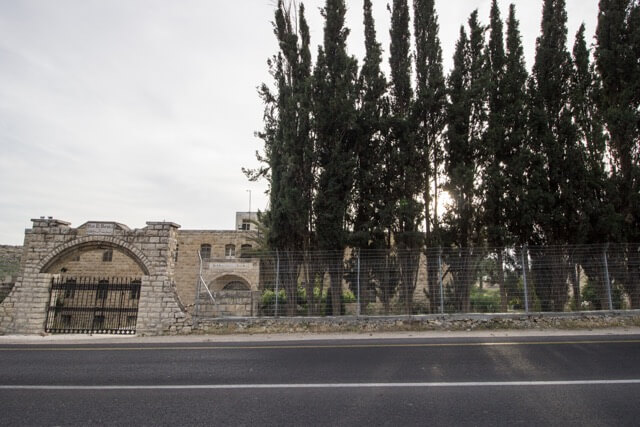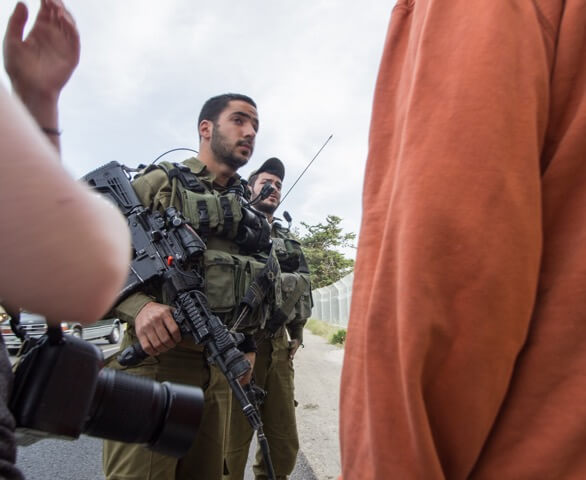New West Bank settlement casts light on clandestine role of international support for settlers
 Sunday, May 31, 2015 at 03:43PM
Sunday, May 31, 2015 at 03:43PM http://mondoweiss.net/2015/05/settlement-clandestine-international
by Hannah Sterling and Sara Ann 29 May 2015 Mondoweiss

The Beit Al-Baraka church compound on Route 60. (Photo: Sara Anna)
Driving south from Bethlehem to Hebron on Route 60, a main settler road in the Occupied West Bank, is Beit al-Baraka, an old church compound made up of eight buildings built from Jerusalem yellow stone. It sits just to the north of Al Arroub refugee camp and for many years it existed as the site of a Presbyterian mission, first as a hospital and later as a hostel. But now its ownership is being questioned, following allegations that it has been sold to right-wing settlers.
Haaretz published last Friday that the site had been sold to Aryeh King, who was renovating the site in anticipation of moving settlers into it. When we visited Beit al-Baraka we found this consistently denied in the area, however investigations show the extent to which the settler enterprise can go to ensure the real identity and intentions of property purchase are hidden.
Strategic Importance
The site proves an important strategic acquisition for the settler movement. One of the primary purposes of settlement building is to enable the annexation of Palestinian land, beyond the internationally recognised ‘border’ of the Green Line between the Occupied Palestinian Territories and Israel. Central to this is the carving up of Palestinian land through an extensive network of settler-only roads, which take previously disparate settlements and link them into contiguous blocs. The radical changes Israel has made to the map of the West Bank preclude any real possibility of establishing an independent, viable Palestinian state – the accepted Western paradigm for a solution. This changes Israel’s role in the West Bank from custodian of the land (following the Oslo Accords which envisioned a period of gradual transferal of power to the Palestinians) to one of de facto sovereign power.
Currently only one settlement – Tzar Karmei – exists (amongst many Palestinian towns and villages) between the Etzion Bloc, a collection of settlements south of Jerusalem, and Hebron in the southern West Bank, where settlers are present inside the city. Acquisition of the Beit al-Baraka site would enable the further connection of settlements between the Etzion Bloc and Hebron, extending settler control over the southern part of the West Bank.
A visit to Beit al-Baraka

A Palestinian worker is seen behind the newly built perimeter fence. (Photo: Sara Anna)
As we approached the newly built perimeter fence which now encircles the compound, we were met by a resident worker, whose family has lived and worked on the compound for generations. Our visit was short lived: it took less than five minutes for the IDF to arrive in order to escort us away from the property, citing the area as a military zone. Prior to our removal the worker told us the compound was in the hands of a Scandinavian church; his son later named this as the Scandinavian Seamen Holy Land Church. The lawyer and spokesperson we were directed to told us it was a ‘Swedish Church’ who owned the property, and that the reports of a sale to Aryeh King were ‘not true’.

Israeli soldiers arrive on site to escort Sterling and Anna from the premises. (Photo: Sara Anna)
Until 2008, a Presbyterian church, The Independent Board of Presbyterian Foreign Missions, owned the compound, where it operated first as a hospital and then as a pilgrim hostel from 1995. When this proved to be unsustainable, the property was sold. Pastor Keith Coleman, told us on the phone from Philadelphia that the church had sold the property to Scandinavian Seamen Holy Land Enterprises, rather than a church, which appears to have been set up as a company with the sole purpose of covertly purchasing this land. First established in 2007 and fully registered as a company in Sweden in 2008, it existed in that form until 2011, and no annual reports or information are available for it from the Swedish Company Registration Office after that year. It appears to have been dissolved in 2012 following the registration of the purchase of Beit al-Baraka with the Civil Administration in Israel.
International Support for Settlements
The ex-board members of Scandinavian Seamen Holy Land Enterprises (who resigned in 2011) are listed as Gro Faye-Hansen Wenske and her husband Bruno Wenske. Faye-Hansen Wenske is the daughter of Norwegian Per Faye-Hansen, whose name appears among the Righteous Among The Nations in Yad Vashem. He also set up the Karmel Institute, which states that it is working for “the fulfillment of biblical prophecy in Israel” while building links between Israel and the Nordic countries, and that “anti-Zionism should be counteracted.”
For her part, Gro Faye-Hansen Wenske has made no secret of her desire to ethnically cleanse Israel and the Occupied Territories of ‘Arabs’, saying in an opinion article published by Norwegian news site Dagen, that “the only solution is to throw out the Palestinians” and that Israel’s first mistake in 1948 was when they “gave the minority group [the Palestinians, after the mass expulsion of 1948] who lived in their country too much power.” Speaking of her father’s views she said “I am now convinced that… my father was right, the Arabs must get out of Israel.”
A Haaretz investigation has found that, in 2012, Scandinavian Seamen Holy Land Enterprises was acquired by American Friends of Everest Foundation, run by Irving Moskowitz. Moskowitz, an United States citizen, is part of an extensive industry of US non-profits using their tax-exempt status to fund the settlement enterprise. The funnelling of tax-exempt funds to organisations, which then purchase property for the purpose of turning them into settler homes, has been extensively reported on in the media. According to Haaretz, Moskowitz is the main funder behind Aryeh King’s activities and his purchase of properties in East Jerusalem. The Everest Foundation owns a number of properties in East Jerusalem, valued at $12 million, and now also owns the Swedish company that controls the church compound. Moskowitz is also responsible for the Irving Moskowitz Foundation, a tax-exempt organization that transmits money to other ostensibly charitable groups such as Friends of Ir David, which then subsidize organizations which purchase Arab-owned property and land for the purpose of settlement. One example of an organization indirectly funded by the Irving Moskowitz foundation is Elad – the group responsible for the purchase of 25 housing units in Silwan, East Jerusalem, and the subsequent take-over by settlers in September 2014 – to whom Friends of Ir David donated almost its entire revenue in 2011 and 2012.
Israeli Policy
Despite the fact that this acquisition of the Beit al-Baraka land by settler groups took place in secret, without the knowledge of the IDF or the Israeli government, it is highly likely that pro-settlement politicians will exert pressure to enable the new residents to stay. There is a strong historical precedent of the Israeli state legalising outposts that have initially been marked as unauthorised, resulting in a de facto policy of support.
In the case of Beit al-Baraka, the true identity of the owner and the intended plans for the site had, until now, been kept well hidden. The Palestinian family from Arroub camp who live and work on the compound were unaware of the developments. Some residents of the surrounding area did express concerns regarding Israeli intentions in the area, however, these mostly focussed on the area south east of Arroub camp, where last year two homes were demolished, ostensibly due to their failure to acquire the necessary building permits, and where residents of the camp say the Israelis are planning for a settlement.
New Foreign Ministry Head Dore Gold recently rejected Israel’s obligation to withdraw to the Green Line in a statement that said although “many continue to demand that Israel retreat to the lines that existed on the eve of the war. Let us say clearly: Israel cannot, should not, and will not withdraw to indefensible borders.” This comes along with a recent speech by Israel’s new Deputy Foreign Minister Tzipi Hotovely in which she signaled her intention to gain global legal recognition of the West Bank settlements and asserted “this land is ours. All of it is ours.” Following the Israeli election in March 2015 and subsequent formation of the most right-wing government Israel has ever seen, the case of Beit al-Baraka seems part of the inevitable settlement expansion for the purpose of establishing new border realities, as well as casting further light on the clandestine role of individual settler advocates.
--------------------------------------------------------
About Hannah Sterling and Sara Anna
Hannah Sterling is an activist and writer currently living and writing in Aida Refugee Camp in the West Bank. Sara Anna is a documentary filmmaker currently working from Aida Refugee Camp in the West Bank.
 APJP |
APJP |  Post a Comment |
Post a Comment |
Reader Comments